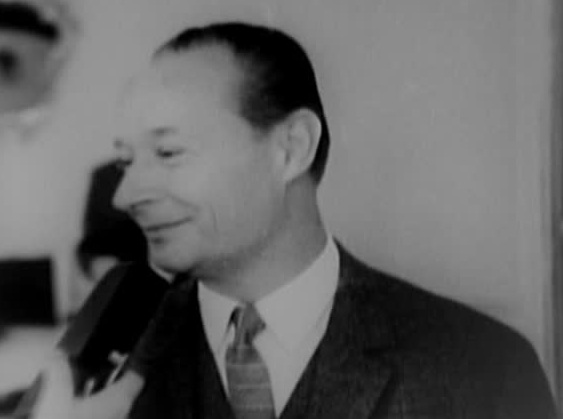Alexander Dubcek
Alexander Dubček was the first secretary of the Communist Party of Czechoslovak from 1968 to 1969. He is best known for leading the country during the Prague Spring of 1968.
Dubček was a communist, but he housed strong reforming tendencies. Moscow could not tolerate the Prague Spring and Dubček was swiftly toppled and sent into exile. After the collapse of the Soviet Union, he briefly re-emerged as a leading political figure until his death in 1992.
Born on 27 November 1921 in Uhrovec, Slovakia, at the age of three Alexander Dubček and his family relocated to the Soviet Union. Dubček grew up under the rule of Joseph Stalin Dubček returned to Czechoslovakia in 1938. Czechoslovakia was occupied by the Nazis in 1939 and Dubček fought with the resistance movement during World War Two. During the war Dubček became a member of the Communist Party of Slovakia.
After the 1948 Czechoslovak coup d'état, the Communist Party of Czechoslovakia took control of Czechoslovakia. In 1949, Dubček became a Communist official and he became a member of the National Assembly in 1951. During the 1950s he was returned to Moscow to receive a “political education”. He graduated from the Moscow Political College in 1958.

By 1958, Dubček was viewed as a politician who could be relied on by Moscow. In 1958 he also joined the Central Committee of the Communist Party of Czechoslovakia, which he served as a secretary from 1960 to 1962 and as a member of the presidium after 1962. From 1960 to 1968 he once more was a member of the federal parliament.
In the mid-1960s opposition mounted against Antonin Novotný, the party's leader in Czechoslovakia, as he was not able to come up with a solution to country’s deteriorating political situation. Dubček did not initiate an attack against Novotný, but he made no protestations at the thought of being chosen to succeed him. O Dubček became the new First Secretary of the Communist Party of Czechoslovakia on 5 January 1968.
This marked the beginning of the Prague Spring. During this time Dubček took steps to liberalise the party by scaling back its totalitarian aspects, while maintaining its dominance. Dubcek promised reform, democratisation and, using Nikita Khrushchev‘s phrase, ‘socialism with a human face’.
He eased press censorship, allowed greater artistic and cultural freedom, pardoned victims of political purges, eased travel restrictions, promised to guarantee civil rights and liberties and permitted a degree of democratic reform. Communist Party members were also encouraged to question the policy of the party and advance their own views - something that had previously been strongly discouraged.
But newspapers took advantage of the lack of censorship to publish scathing reports about government corruption and incompetence.
Under Dubček, farmers were also given more independence to form co-operatives and trade unions enjoyed more bargaining rights. However, Dubček was adamant that Czechoslovakia would not leave the Warsaw Pact.
From July to August 1968, the new leader met senior Moscow officials on the Slovakia-Ukraine border to let them know that his actions would not affect the Warsaw Pact. On 3 August 1968 he reiterated this message to the members of the Warsaw Pact.
But Moscow informed Dubček that West Germany was planning an invasion of the Sudetenland. The Soviet Union would supposedly provide Czechoslovakia with troops to defend herself from the upcoming invasion. Dubček refused this offer, but it made little difference.
On 20-21 August Soviet troops, along with some other troops from the Warsaw Pact, invaded Czechoslovakia. Dubček was arrested and taken to Moscow, where he was later released. Dubček later called the talks “comradely” and confirmed that he would not be continuing with his reform programme. He was returned to office in Prague but his work was highly censured. He remained First Secretary until April 1969 when he was appointed Speaker of the Federal Assembly - a minor political post. He was replaced by Gustav Husak, a man more loyal to Moscow and devoted to the socialist cause, who immediately reversed his reforms. In 1970, Dubček was expelled from the Communist Party.
For the next 19 years Dubček was politically dormant. But when the Cold War ended he came back into the political limelight. In November 1989, Dubček was re-appointed Speaker of the Federal Assembly. He was fiercely against the dissolution of Czechoslovakia into two separate countries (the Czech Republic and Slovakia). He believed that a continued union between the two regions was mutually beneficial. However, he did not live to see the dissolution take place on 1 January 1993. He died on 7 November 1992 as a result of injuries sustained in a car accident.
See also: Alexei Kosygin
MLA Citation/Reference
"Alexander Dubcek". HistoryLearning.com. 2024. Web.
Key facts
| Name: | Alexander Dubcek |
| Birth Date: | 27 November 1921, Uhrovec, Czechoslovakia(now Slovakia) |
| Death: | 7 November 1992 (aged 70), Prague, Czechoslovakia (now Czech Republic) |
| Political affiliations |
Communist Party of Slovakia: 1939-1948 Communist Party of Czechoslovakia: 1948–1970 Public Against Violence: 1989-1992 Social Democratic Party of Slovakia: 1992 |
| Key appointments | First Secretary of the Communist Party of Czechoslovakia:January 1968 - April 1969 Chairman of Federal Assembly of Czechoslovakia:April 1969-October 1969; December 1989 - June 1992 |
